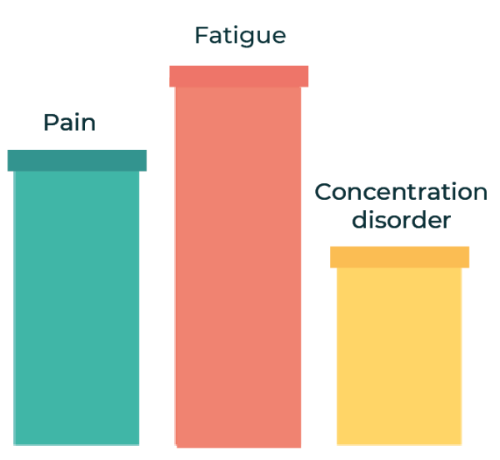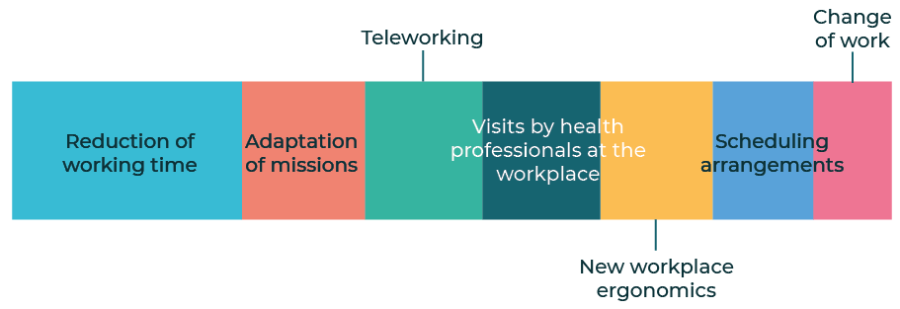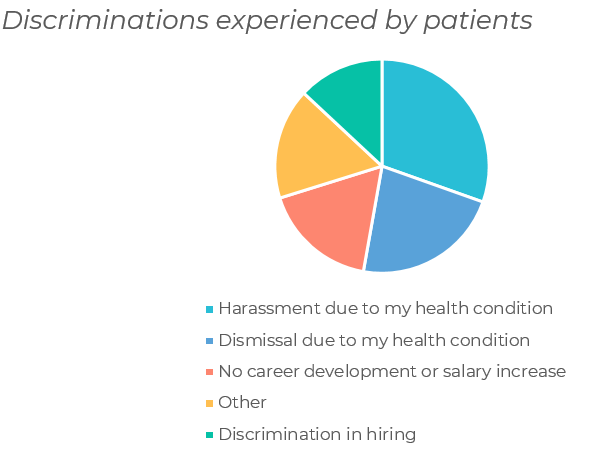Working life and chronic illness: the experiences and solutions of Carenity members
Published 6 Jun 2019 • Updated 7 Jun 2019 • By Louise Bollecker
Is it possible to continue working when you have a chronic illness? Through our major international survey, we wanted to understand the patients' daily professional lives, their difficulties and their solutions.

Survey conducted in May 2019 among 1,753 Carenity members in France, the United Kingdom, Italy, Spain and the United States. For more relevance, we present here the results given by Carenity members in the United Kingdom.
Chronic illness has a strong impact on professional life
We wanted to understand if having a chronic disease had an influence on your career path. For the Carenity members who responded to the survey, the finding is clear: on a scale of 1 to 10, they rate the impact of the disease on their working lives at 7.4.

Working life is mainly disrupted by fatigue (impact of 8/10) resulting from the disease. This podium is completed by chronic pain (7/10) and attention and concentration disorders (6.7/10).

>> Chronic fatigue: read patients' experiences and solutions
On the other hand, medical care (frequency of medical appointments, how treatments are administered) does not seem to be the aspect that affects working life the most. However, a score of 6.2/10 was given to the impact of side effects of treatments on work.
A majority of patients have already taken leave because of their illness
Faced with fatigue and other symptoms of their illness, patients may no longer be able to work as usual. 65% of respondents took time off work because of their illness in the past 12 months. In 35% of the cases, it was sick leave. In total, over the past year, respondents were absent from their positions for 70.7 days. Craftsmen, traders, company managers and executives and higher intellectual professions were more numerous not to take time off.
The distribution of leave taken because of illness:

Nearly half respondents received work accommodations
For 52% of our respondents, no adjustments have been made to limit the impact of the disease on their working lives. For the 48% who were able to benefit from adjustments, it was mainly a reduction in working time that was proposed (41%), followed by an adaptation of the missions (22%) and teleworking (21%). A change of work was proposed to only 14% of patients.
>> Working life: what rights for reintegration do patients have?
Compared to other countries where the survey was conducted, the United Kingdom is the country where members have benefited most from work accommodations.
“Always be honest with your employer and people you work with as education is the best solution. People don’t know what you need unless you tell them.”
Accommodations for patients:

The Equality Act 2010 states that an employer has to make ‘reasonable adjustments’ to avoid you being put at a disadvantage compared to non-disabled people in the workplace. For example, adjusting your working hours or providing you with a special piece of equipment to help you do the job.
“What I need? Not sitting on broken chairs. Being allowed to take regular breaks. Having somewhere to lie down and not to be judged for needing to do this. Access to ice packs. Transport available to get me to the workplace rather than public transport. Education for colleagues and managers to stop them from judging”
Patients lack knowledge about available financial support
80% of the Carenity members who responded to the survey do not receive any financial support related to their professional life. While 43% are not eligible and 7% have not taken any action, 38% do not know of any financial assistance from which they could benefit.
>> How do I know if I’m eligible? Check the benefits calculators here
If you’re ill or disabled, Employment and Support Allowance (ESA) offers you financial support if you’re unable to work or personalised help so that you can work if you’re able to. Unemployed, self-employed and employed people can apply.
Discrimination related to illness in the workplace
52% of respondents to this survey spoke openly about their illness to all the people they interact with in the workplace. "Only" 13% of the people knowing about the disease were unpleasant.
“I don’t believe any solutions will be made in the near future to accommodate mental health illnesses. There’s still a lot of lip service out there with no real practical way of implementing it. It remains a stigma in the work place, unfortunately.”
Nevertheless, 50% of patients felt discriminated against. 35% of them blame their employer. It’s against the law for employers to discriminate against you because of a disability. Remember that the Equality Act 2010 protects you and covers areas including: application forms, interview arrangements, aptitude or proficiency tests, job offers, terms of employment, including pay, promotion, transfer and training opportunities, dismissal or redundancy and discipline and grievances.

Carenity members' solutions to better integrate patients into the labour market
We submitted several solutions to the patients who responded to the survey. Many were approved, but three were preferred by our members:
- Carry out actions in companies to raise awareness of chronic diseases.
- Adapt the working environment by creating spaces for resting and/or isolating oneself (e. g. to take one's treatment)
- The State should financially help patients to be better equipped, hence adapting more easily to the work life (transport to the workplace, adapted chairs/offices...)
78% of patients also saw fit to promote the professional transition of patients with chronic diseases to a more appropriate profession.
On the other hand, only 46% of our members are in favour of the obligation of companies to employ people with chronic diseases. 16% of patients are against it and 38% have remained undecided about this measure.
“Unfortunately my director said I was not up to standard and sacked me. Saying my concentration levels are not very good.”
 Thanks to all the members who participated in this study!
Thanks to all the members who participated in this study!
Thank you to all Carenity members who shared their experience to advance the integration of chronically ill people into the labour market. Below you can read more of their opinions and solutions regarding patients' professional lives.
“To have more information about the illnesses available so more people getting a better understanding of what there colleges have to endure whilst still trying to carry out their daily work activities”
“Financial help to allow people to work part time would be good. Understanding that not all disabilities are visible and that just because we force ourselves to go to work and smile, doesn’t mean we don’t go straight to bed when we get home.”
“I actually worked at a doctor's and they threatened me with disciplinary actions so I had to leave as I couldn't cope and that was 10 years ago. If the medical profession doesn't care or understand how can anyone else?”
“I think enough is already being done. It is up to the individual whether to continue in the professional environment they are in after their diagnosis & condition has stopped them from doing that career position.”
“There are very few jobs that will take on anyone with a chronic illness or disabilities as there are many other people without after the same job. Provide more incentives to employ chronically disabled people.”
Survey conducted in May 2019 among 1,753 Carenity members in France, the United Kingdom, Italy, Spain and the United States. For more relevance, we present here the results given by Carenity members in the United Kingdom.
9 comments


 Facebook
Facebook Twitter
Twitter





